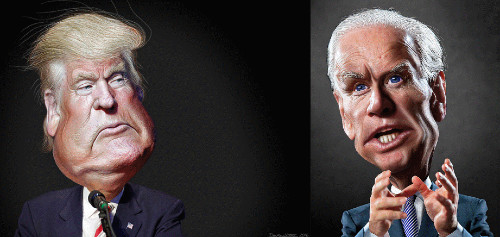It is painful to contemplate that a nation of over 300 million could not manage to produce a more decorous and intellectually challenging disputation for its highest elected office. Those familiar with history on this subject will recall the magnificent Lincoln-Douglass debates at a time, more than a century and a half ago, when the nation was similarly divided and was facing equally momentous issues concerning its future. After these debates and before the 1860 election, the remarks of the debaters were printed in the form of a book which was widely distributed for the edification of voters. But, of course, that was in an era when politicians were educated men who actually spoke cultivated English, so their utterances could without embarrassment be converted to (unghostwritten) book form.
The art of political debate in America was still not dead even within living memory, as recently as sixty years ago, when Nixon and Kennedy faced off in 1960. Kennedy was the last generation of American politicians who was also an intellectual, fully capable of writing his own speeches (and books), a skill none of his successors in U.S. politics have commanded. Nixon was not, but he was an eloquent lawyer with immense experience in politics and in his own profession. If two-thirds of America’s adult population eagerly followed their debates, it was because watching the encounter between these two serious (and genuine) political figures undeniably was worth a conscientious citizen’s while.
On the Senate side during the same regrettably bygone era, there were towering men such as Everett Dirksen, Hubert Humphrey, Henry Jackson, and William Fulbright. Their ideological positions were diverse (which means that they stood for something) but their phrases were elegant, utterances edifying, and manners courtly. With some justice, my grammar school social studies teacher (bless her soul) taught us in class that the U.S. Senate was “the greatest debating club” on earth. I remember her fondly as a true believer who passed the faith uncorrupted to her pupils.
Between then and now, the collapse, as exemplified by cartoonish public debates between Presidential nominees, has been reflected in the degeneration of American politics and vulgarization of public discourse in particular. It is immaterial whether this process was the result of a “hidden hand” deliberately selecting and promoting to public office human material of the lowest calibre, because these specimens are the most easily manipulable, or the result of a general moronization and crumbling of societal standards which has made eloquence incomprehensible, good manners déplacé, and convictions threatening. What matters is the end result, and to our immense chagrin we saw it on stage on September 29, with two buffoons slugging it out in an improvised television studio. And they called that a debate.
A great country’s symbolic comedown was keenly noticed throughout the astonished world and the implications and consequences of that perception it will not be possible to minimize or disguise with blustering phrases and jingoistic bombast. The shameful nudity of both potential emperors was plainly in evidence and their pitiful condition will inexorably also affect the perception of their empire, whichever of them is ultimately enthroned to lead it to further decline.
A quick review of the international press gives some sense of the magnitude of the disaster.
The London Guardian called the debate a “national humiliation” that will prompt the rest of the world and future historians “to weep”.
For The Times, “the clearest loser from the first presidential debate between Donald Trump and Joe Biden was America.”
Der Spiegel mocked the debate as a “joke, a low point, a shame for the country”.
El Pais saw it as “the most chaotic and least edifying spectacle of political theater ever produced on American television.”
With French subtleness Le Monde called it a “chaotic and brutal confrontation between two septuagenarian candidates,” but the underlying broader perception was clear. Libération chimed in that it was “chaotic, childish, and gruelling”.
Sydney Morning Herald’s take on it was uncertainty whether “the chaos and tenor of the event said something more fundamental about the state of American democracy.”
Need we go on?
Times of India likened the debate to “mud-wrestling”, adding “the United States embarrassed itself before the world for nearly 100 minutes”.
Many will recall a cruelly derisive comment gleefully repeated at the height of the brief unipolar moment that the recent superpower adversary had at last been reduced to an “Ivory Coast with nuclear weapons.” What we are witnessing now is a quick turn of the wheel of fortune and the swift reduction of a once admirable country to a coarse, violence-prone Wild West joint, also armed with nuclear weapons.
Author
Stephen Karganovic is president of the Srebrenica Historical Project


